Robert Knox's Blog, page 15
February 4, 2019
The Garden of Cinematic Art: The Lives of Those Condemned to the 'Chaotic Hell' of Capernaum
 A thin, undersized boy of -- possibly -- twelve does chores for his family. Bargaining with street merchants, stretching a little money, knowing his way around. The street is a densely crowded shantytown of ad-hoc markets. A "slum." We have already been shown an airplane view of this district. It looks like a refugee camp for people fleeing a war zone. Those black circles on all the flat roots, turn out, when we get closer to them to be automobile tires laid on top of tarpaulins to keep the rain out, and perhaps the sun off, the flat roofs. The boy drags his purchases into a deteriorating building and up a narrow stairway. His second floor apartment is flooded. His mother, in a state of near derangement, anger and despair, is trying to soak up water while swearing at the landlord. This happens whenever he takes a shower, she complains, but he won't fixing the leaky pipes. The family can't demand anything of him him, however, since they're living on his sufferance, can't pay rent and are afraid he'll throw them out. The boy's family has nothing. No money, power, well-connected friends, education, or viable connections to a civil society. Their children don't have birth certificates. Nobody has a job. But they do have six or seven children (the parents don't seem sure). The father, who's only seen sitting on the couch, protests that he has no idea how any of this has happened to him. Zain, the streetwise 12 year-old, is the eldest. When he notices that his sister closest in age has spotted a sheet (the children don't have a bed; they sleep on a sheet on the floor) with blood, he helps her hide the evidence of menstruation from her parents. Who, he warns her, will 'sell' her to a neighborhood loser who lusts for her once they find out she's now 'a woman,' even though she's only eleven. As it turns out, Zain, who loves his sister more than anyone in his world, has good reason for his fears. This is not the Middle Ages. This film is not set in one of the world's poorest, most backward countries. This is, we are told, Lebanon, and the slum or shantytown whose rooftops we have glimpsed from above is in Beirut. Oddly, we have been to this city seven times and never glimpsed anything remotely resembling the images we are seeing on the screen. How well hidden are the lives of the poor. The most important thing I can tell you about this movies is that you must see it. What else I can tell you without spoiling too much, and because you will find this information prominently in any newspaper or online review, is the movie centers on Zain's subsequent struggle to maintain a caring, wholly committed custody of one-year-old baby who has been separated from his mother -- for reasons I won't go into here. But know that the baby is Ethiopian. Yes, although the version of Lebanon we are seeing here does not seem terribly inviting, people come from other countries, such as Ethiopia, to seek work in this country of crowded avenues, luxury hotels, lovely beaches, and exquisite restaurants (none of which are featured in this film). They come from the Philippines and South Asia as well. And sometimes, to use the smear-word American politics has bequeathed to the world, they are "illegals." Also, not included in the tally above, Lebanon is also the host country for millions of Palestinian (since the late 1940s) and Syrian (from the start of the civil war) refugees. Know also that both the boy who plays Zain, and the toddler who is far too infantile to know that he is 'performing' are tremendous screen presences. And as tough their circumstances become, neither gives into them -- neither stops doing the best he can. And so while we root for Zain to survive, get by, figure things out, and find some sort of opportunity for a decent life -- not to mention 'justice' for what he and other children have suffered, we are also getting an unforgettable tour of life on the street in refugee-like conditions, revealed by a brilliant guide in a brilliant and positively riveting film.
A thin, undersized boy of -- possibly -- twelve does chores for his family. Bargaining with street merchants, stretching a little money, knowing his way around. The street is a densely crowded shantytown of ad-hoc markets. A "slum." We have already been shown an airplane view of this district. It looks like a refugee camp for people fleeing a war zone. Those black circles on all the flat roots, turn out, when we get closer to them to be automobile tires laid on top of tarpaulins to keep the rain out, and perhaps the sun off, the flat roofs. The boy drags his purchases into a deteriorating building and up a narrow stairway. His second floor apartment is flooded. His mother, in a state of near derangement, anger and despair, is trying to soak up water while swearing at the landlord. This happens whenever he takes a shower, she complains, but he won't fixing the leaky pipes. The family can't demand anything of him him, however, since they're living on his sufferance, can't pay rent and are afraid he'll throw them out. The boy's family has nothing. No money, power, well-connected friends, education, or viable connections to a civil society. Their children don't have birth certificates. Nobody has a job. But they do have six or seven children (the parents don't seem sure). The father, who's only seen sitting on the couch, protests that he has no idea how any of this has happened to him. Zain, the streetwise 12 year-old, is the eldest. When he notices that his sister closest in age has spotted a sheet (the children don't have a bed; they sleep on a sheet on the floor) with blood, he helps her hide the evidence of menstruation from her parents. Who, he warns her, will 'sell' her to a neighborhood loser who lusts for her once they find out she's now 'a woman,' even though she's only eleven. As it turns out, Zain, who loves his sister more than anyone in his world, has good reason for his fears. This is not the Middle Ages. This film is not set in one of the world's poorest, most backward countries. This is, we are told, Lebanon, and the slum or shantytown whose rooftops we have glimpsed from above is in Beirut. Oddly, we have been to this city seven times and never glimpsed anything remotely resembling the images we are seeing on the screen. How well hidden are the lives of the poor. The most important thing I can tell you about this movies is that you must see it. What else I can tell you without spoiling too much, and because you will find this information prominently in any newspaper or online review, is the movie centers on Zain's subsequent struggle to maintain a caring, wholly committed custody of one-year-old baby who has been separated from his mother -- for reasons I won't go into here. But know that the baby is Ethiopian. Yes, although the version of Lebanon we are seeing here does not seem terribly inviting, people come from other countries, such as Ethiopia, to seek work in this country of crowded avenues, luxury hotels, lovely beaches, and exquisite restaurants (none of which are featured in this film). They come from the Philippines and South Asia as well. And sometimes, to use the smear-word American politics has bequeathed to the world, they are "illegals." Also, not included in the tally above, Lebanon is also the host country for millions of Palestinian (since the late 1940s) and Syrian (from the start of the civil war) refugees. Know also that both the boy who plays Zain, and the toddler who is far too infantile to know that he is 'performing' are tremendous screen presences. And as tough their circumstances become, neither gives into them -- neither stops doing the best he can. And so while we root for Zain to survive, get by, figure things out, and find some sort of opportunity for a decent life -- not to mention 'justice' for what he and other children have suffered, we are also getting an unforgettable tour of life on the street in refugee-like conditions, revealed by a brilliant guide in a brilliant and positively riveting film. A few other considerations. As I learned from reading an interview, the part of Zain is played by 12 year-old also named Zain, who was in fact a Syrian refugee living Lebanon (as millions do), though his film character is Lebanese. It seems clear to me that director Nadine Labaki has clearly avoided any grounds for putting the blame for the poverty her film portrays on the presence of Syrian refugees. She also portrays Zain's family without any religious affiliation -- you can't blame his parents' hopeless, backward worldviews on either Islam or Christianity, both large presences in Lebanon, and Syria, and of course throughout the Middle East. It's also worth noting that many of the film's Lebanese characters behave in kind and responsible ways. The Ethiopian mother is more sinned against than sinning. And we are treated, near the end, to scenes of jails filled with the 'undocumented' nationals from many other countries. The film left me pondering some wider questions. What does it take for people born in impoverished circumstances (in poor countries, of course, but also in more prosperous ones such as the US) to survive? Does their life have to be so hard? Should we still be in the business of discouraging them from moving about the world in hopes of a better chance at life. And, possibly, deeper ones: What's wrong with the human race? Or with human societies? Or people, period?
Published on February 04, 2019 15:36
February 3, 2019
The Garden of Verse: Watching 'the Wheels Go Round and Round' in the Trying Days of the Third Millennium
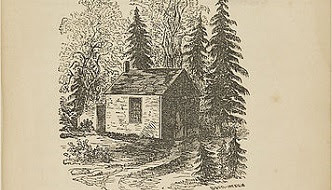 I got around to the idea of New Year's resolutions a few days after the current annus novus -- or annus mirabilis (year of miracles) began.
I got around to the idea of New Year's resolutions a few days after the current annus novus -- or annus mirabilis (year of miracles) began. And decided to use a small collection of marvelous statements of various levels of familiarity that were running in my head, or put on paper somewhere, as the key ingredients in a poem of resolutions to remind myself that a new number has actually appeared in the last column of humanity's bookkeeping.
I'm referencing Whitman, quoting Thoreau and critic Harold Bloom, and slightly misquoting from "Les Miserables" here, among the classics. And borrowing from John Lennon and the band Tears for Fears from among the pop moderns.
Everywhere we turn, we are living in a palace of wonders, of infinite dimensions.
And just because human beings are among these wonders, and wholly capable of appreciating the life that goes on both within us, and without us (borrowing again), doesn't mean we have the right to go around destroying things.
My poem "Late Resolutions," posted below, appears along with two others, plus marvelous poems from some 30 other poets, in the latest edition of Verse-Virtual.com.
Please take a look at the February issue at http://www.verse-virtual.com/poems-and-articles.html
Late Resolutions in the
Court of Naked Appeals (and Borrowed Quotes)
Given that:
"Master of the [Court]/ Isn't worth my spit!
Hypocrite and toady/ and inebriate!" (Apologies to "Les Miz")
That only the great poets wrestle
with what it means to be human: viz Whitman,
per Harold Bloom: "As Adam early in the morning,
Walt is the unfailing God-man, our androgyne."
That our priorities may at times be reversed,
viz. Thoreau: ''Hardly a man takes a half-hour's nap after dinner,
but when he wakes he holds up his head and asks, 'What's the news?'''
and yet what requires our greatest attention is that which is always before us.
And that contemplation of these homely universals
may require a wide-angle lens,
viz. John Lennon: "I'm just sitting here watching the wheels go round and round.
I really love to watch them roll."
Resolved:
To take a walk outdoors everyday this winter,
even when it's sleeting gobshite.
To demonstrate in the court of Personal Appeals
my undying affections to those who continue
to bless both others and myself with displays of humanity and excellence,
and to accept, with patience, that "everybody wants
to rule the world." (per Tears for Fears)
To look both ways before crossing the bridge of time
when we come to it, as we always will.
To hold the page when the language of music
takes hold of me and patiently turn each leaf of the score on cue.
To strive to be one of those who, after we give the
land back to the indigenous, they let stay.
To love 'nature,' whatever is meant by that most elastic
of terms, even when it can no longer love me back.
To love those who always have.
[More at http://www.verse-virtual.com/robert-knox-2019-february.html ]
Published on February 03, 2019 09:39
January 25, 2019
The Garden of the Seasons: Twilight of the Idols -- or Idylls -- and It Happens Every Night
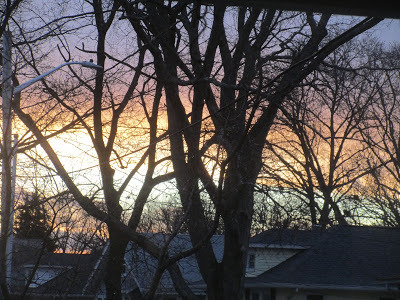
Winter, with its short days and early sunsets, puts a premium on twilight watching. January has offered a lot of good ones to watch this year, to which I have posted here some photographic allusions.
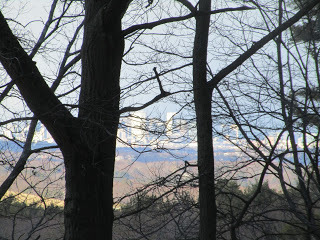 Here are few thoughts about twilight: Right from the top, we have of course perhaps everybody's favorite classic TV series title: "The Twilight Zone."
Here are few thoughts about twilight: Right from the top, we have of course perhaps everybody's favorite classic TV series title: "The Twilight Zone." I start with one of my recent allusions to that classic entertainment that not only gave us a favorite phrase, but perhaps a name for whole genre of thinking about the weirdness that human beings can get up to:
American voters and our sick, archaic electoral college voting system seating the current pretender in the White House is like putting the whole country through a "Twilight Zone" episode.
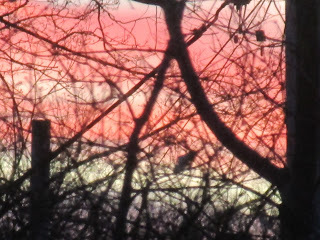 Here's classical reference (found while searching for information about the ancient Roman Republic destroyed by the famous Empire) that winds up with a familiar metaphor: "Dramatic artist, natural scientist and philosopher, Plutarch is widely regarded as the most significant historian of his era, writing sharp and succinct accounts of the greatest politicians and statesman of the classical period. His famous work The Lives, a series of biographies spanning the Graeco-Roman age, illuminates the twilight of the old Roman Republic from 157-43 BC."
Here's classical reference (found while searching for information about the ancient Roman Republic destroyed by the famous Empire) that winds up with a familiar metaphor: "Dramatic artist, natural scientist and philosopher, Plutarch is widely regarded as the most significant historian of his era, writing sharp and succinct accounts of the greatest politicians and statesman of the classical period. His famous work The Lives, a series of biographies spanning the Graeco-Roman age, illuminates the twilight of the old Roman Republic from 157-43 BC." 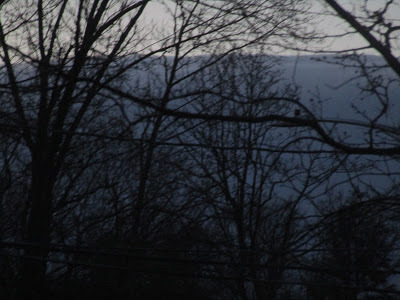 On a homier note, my comment on a sunset/moonrise combination glimpsed last August: "Twilight over Quincy Harbor, viewed from Wollaston Beach. The full moon up before full darkness."
On a homier note, my comment on a sunset/moonrise combination glimpsed last August: "Twilight over Quincy Harbor, viewed from Wollaston Beach. The full moon up before full darkness."Last month (December 2018) I went back to the metaphorical well for a comment on a picture of Rod Sterling, used by a Facebook post that imagines Sterling's persuasive narrative voice intoning, "Imagine if you will a country in which 1 percent of the population controls almost all the wealth and power, and [ wait for it] The other 99 percent are so brain-washed they fight vigorously to keep it that way."
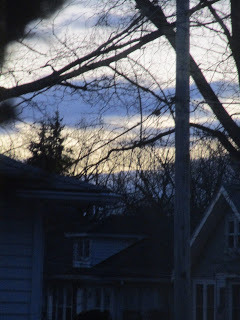 To which I appended, "We must be in the Twilight Zone. A world of horrific contradictions that make decent people run screaming into the streets."
To which I appended, "We must be in the Twilight Zone. A world of horrific contradictions that make decent people run screaming into the streets."Finally from my recent 'Calendar Poems," published this month on Verse-Virtual.com:
January
More Snow Coming
Blue snow at twilight
The silence of the day.
On our daughter’s Beirut balcony
the bougainvillea grows new leaves.
For the record, I'm not into vampires, and so I will make no reference to the entertainment conglomerate that dared to steal the magically suggestive word 'twilight' for pecuniary purposes.
You don't have to be an immortal, or a magical being of any sort, to appreciat and feel a special connection with the magical hour, when day (somehow) turns into night (how about that?) and everything that was clear and distinct turns into a shadier, quieter, spookier (perhaps) and mystical version of what we thought it was.
And, weirdest of all, the magic happens every day.
Published on January 25, 2019 16:50
January 20, 2019
The Garden of History and Verse: Why We Love Mary Oliver's Poetry
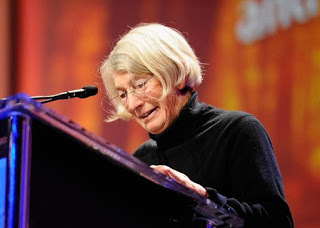 Mary Oliver, who died on Jan. 17 at age 83, was probably America's favorite contemporary poet. As one obituary I read points outs, she was rare in possessing both a large popular following and sufficient respect from the literary prize-givers to be awarded a Pulitzer Prize and the National Book Award. Commentators often used the word "accessible" in explaining her popularity. But accessibility is the very the quality that kept some academics at arm's length: Not only does her work offer spiritual consolation, her poems simply weren't 'difficult' enough. They didn't need critics and scholars to explain what they 'meant.' One of Mary Oliver's best loved poems, cited in a number of the appreciations and obituaries written since her death, is "In Blackwater Woods." The title itself is an interesting choice, because the poem itself offers so many opportunities for a grander statement. But the poet eschewed grand statements in choosing a title, perhaps wary of the grandiose. The poem could have been titled "Fulfillment," "Learning," "Salvation" or even "Spring," or something with that big word 'spring' in it; or of course "letting go." Others have named their poems "Letting Go." I think the title was meant to suggest 'no grand claims are being offered here,' though in fact the grandest ones do arrive -- naturally. I think the chosen title understates the ambition of the poem. Similarly, Mary Oliver's "accessible" poems don't rely on unusual vocabulary, difficult syntax, or complicated formal structures, but that doesn't mean they are short of artistry. Here's the poem:
Mary Oliver, who died on Jan. 17 at age 83, was probably America's favorite contemporary poet. As one obituary I read points outs, she was rare in possessing both a large popular following and sufficient respect from the literary prize-givers to be awarded a Pulitzer Prize and the National Book Award. Commentators often used the word "accessible" in explaining her popularity. But accessibility is the very the quality that kept some academics at arm's length: Not only does her work offer spiritual consolation, her poems simply weren't 'difficult' enough. They didn't need critics and scholars to explain what they 'meant.' One of Mary Oliver's best loved poems, cited in a number of the appreciations and obituaries written since her death, is "In Blackwater Woods." The title itself is an interesting choice, because the poem itself offers so many opportunities for a grander statement. But the poet eschewed grand statements in choosing a title, perhaps wary of the grandiose. The poem could have been titled "Fulfillment," "Learning," "Salvation" or even "Spring," or something with that big word 'spring' in it; or of course "letting go." Others have named their poems "Letting Go." I think the title was meant to suggest 'no grand claims are being offered here,' though in fact the grandest ones do arrive -- naturally. I think the chosen title understates the ambition of the poem. Similarly, Mary Oliver's "accessible" poems don't rely on unusual vocabulary, difficult syntax, or complicated formal structures, but that doesn't mean they are short of artistry. Here's the poem:In Blackwater Woods
Look, the trees
are turning
their own bodies
into pillars
of light,
are giving off the rich
fragrance of cinnamon
and fulfillment,
the long tapers
of cattails
are bursting and floating away over
the blue shoulders
of the ponds,
and every pond,
no matter what its
name is, is
nameless now.
Every year
everything
I have ever learned
in my lifetime
leads back to this: the fires
and the black river of loss
whose other side
is salvation,
whose meaning
none of us will ever know.
To live in this world
you must be able
to do three things:
to love what is mortal;
to hold it
against your bones knowing
your own life depends on it;
and, when the time comes to let it go,
to let it go.
(from American Primitive, 1983)
The poem consists entirely of common words and is structured in four-line, free verse stanzas. The formal patterning of the stanzas creates that 'certain formal feeling' that Dickinson famously borrowed from standard English hymns. The structure also helps establish a certain expectation, the one that reminds us that 'poetry' has the same origins as 'song.' Yet you could write the words and sentences out, just as they are ordered here, in a paragraph, and the result would read like prose. It would be grammatical. But this is poetry -- i.e. the intensification of feeling -- not prose. The lines are very short, frequently consisting of only two, three, or four words. This is a common approach to free verse, popular for a century or more, reminding us of William Carlos Williams' iconic miniature "So Much Depends." The basic approach to enjambment in this sort of free verse -- where to end the line -- is to follow spoken English syntax. But in this poem the poet frequently breaks syntactical units into even smaller pieces. "Look, the trees" therefore stands by itself as a line. The enjambment turns these three words into a (temporarily) completed statement: 'Look! the trees.' Almost everybody who writes about nature has written something like this. It's Thoreau's advice on achieving wisdom and spiritual freedom: look at trees. The lines that follow show that each foreshortened statement is a cause of wonder. Imagine this: trees/ 'are turning' -- yes, we think, we know trees turn -- 'their own bodies'... Imagine that! Sometime human beings do try to turn 'their own bodies' into something else, but it usually involves new clothes 'into pillars' -- yet another miracle! And then -- wait for it -- which is exactly what the stanza break following this two-word line makes us do -- "of light." Each of these steps to the completed clause, a grammatically complete statement, is itself a marvel, and the tiny pauses -- which the eye of the reader respects, even if the brain rushes on -- gives the reader's mind pause as well. Then, there is the matter of poet's chosen words. Patterned syntax keeps the sentence alive in the second stanza. We are often told that poems appeal to the senses; here's an example. Those same trees that wondrously turn themselves into pillars of light, are also, as we read in the second stanza "giving off the rich/ fragrance of cinnamon/ and fulfillment." Poetry imagines with the guidance of the senses. Because we know the scent of cinnamon, we are more likely to make the leap to "fulfillment." We don't 'smell' fulfillment physically; only metaphorically. And fulfillment is one the themes of the poem. Following syntax once again, a new stanza offers yet another completed clause -- all these clause follow the familiar Biblical and classical imperative "Look," the poem's first word. A classical guide would typically follow that word with an exclamation point. A century ago English poet-novelist D.H. Lawrence wrote "Look! We have come through!" -- a poem about not destroying your marriage in the first few months. But Mary Oliver eschews the exclamation point for the modest comma, as if to say to the reader, 'you will shortly discover these wonders yourself.' This third stanza offers a new clause -- pointing out a new wonder -- beginning with"the long tapers/ of cattails" Again, an appeal to the senses, the word 'tapers' offers a description of what cattails look like, but also suggests another meaning of the word 'tapers' -- candles -- building on the comparison of trees to "pillars of light." This stanza then completes with the marvelous metaphor of "the blue shoulders" -- pause for stanza break -- "of the ponds." Through the remainder of this short poem, the line breaks largely follow the ordinary divisions of syntactical units, but often vary a single word away from the natural break point. So we learn that every pond "no matter what its/ name is, is/" -- stanza break -- "nameless now." The foreshortened syntax, I believe, reflects the interruptions in our conventional thought patterns brought about by the experience the poem seeks to express. The rebirth of nature is the great interrupter of ordinary patterns of thought. Human events are commonly shaped into stories; they have a beginning, a middle and an end. But the life the world -- its trees and its ponds -- exceeds these patterns. Nature, as understood by the seasons, has a beginning, a turn, an end -- and then, guess what? -- a new beginning.
The last five stanzas of this marvelous poem are almost as pointed in their meaning as a sermon, even incorporating the daringly loaded term "salvation." "Every year," the poem tells us, and "everything" the speaker has learned, "leads back to this: the fires
and the black river of loss
whose other side
is salvation,
whose meaning
none of us will ever know." And as if that were not 'meaning' enough for any poem, much less any beautifully descriptive 'nature poem,' the poet offers a frankly prescriptive advisory on how to live. "To live in this world," she tells us, "you must be able/ to do three things:" You can go back to the poem and read those three things yourself. Then ask whether you have heard or read a better, more economically stated expression of three such important 'things.' Many of us -- readers, that is, who turn to poetry rather than to creeds for sustenance -- are likely to come away (as I am) from this poem resolved to take these words to heart, to remember them, and to live their message. And many of us are likely, or at least tempted, to believe (perhaps as a matter of faith) that Mary Oliver did just that.
Published on January 20, 2019 10:23
January 18, 2019
The Garden of Verse: How Should We Talk About Our Lives in Our Poems? Frankly? Not At All?
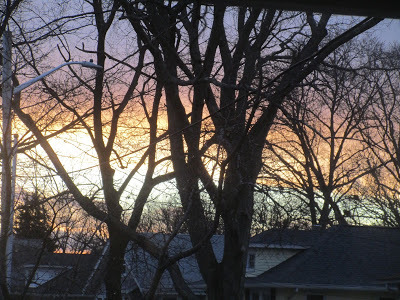 How do we talk about our lives in poems? Should we? How frankly? Alan Walowitz 'goes there' in poems about his wife and a therapist. A poem with an arresting title, "My wife says fuck in the middle of the night" combines intimate detail with quotidian annoyance to yield ironic theology. We go from sexual dysfunction and hot flashes to the annoyingly petty demands of the cat -- "It is the middle of the night.
How do we talk about our lives in poems? Should we? How frankly? Alan Walowitz 'goes there' in poems about his wife and a therapist. A poem with an arresting title, "My wife says fuck in the middle of the night" combines intimate detail with quotidian annoyance to yield ironic theology. We go from sexual dysfunction and hot flashes to the annoyingly petty demands of the cat -- "It is the middle of the night.Nothing is wrong.
Something is always wrong." -- to a semi-ironic proof of the non-existence of God. The poem's last line is classic 'attitude.' In a second poem, "Truly," a poem about being late for a therapy appointment, personal difficulties are both revealed and mocked. The therapist's nod, the speaker tells us, "says/
she’s working hard to think well of me
but is afraid our time is up." If I had to come up with a term for what is so good here, I think I'd say 'voice.' These poems have a winning voice.
We could look at Marilyn Taylor's brilliant, funny "At the Cocktail Party as a confessional poem as well, if we weren't enjoying it so much. The poem appears to bemoan the speaker's tendency to choose the wrong partners: "And yet I’m always heading for
those characters I should ignore—
the ones with habits I deplore:.." But what we're experiencing is the poem's joy in answering the implicit challenge of 'how can I continue link all these rhyming end-words together while keeping readers (and myself) interested and amused'? The solution is this rambunctiously clever poem.
The three "Harry" poems by Michael Newell have the fraught, complex, emotional weight of confessional persons, but the weight lies on the shoulders of a created character, a literary device. In "HARRY TELLS HIS DAUGHTER GOODBYE" we are told "it is a big step, one that looms without pity
before her, and old Harry, tired Harry,
ready to be alone Harry, fears for her, yet
he does not know how to allay fears, hers
or his, and awkwardly pats her shoulder
as she boards the train taking her
to a future where they will seldom see
one another..."The heavy mood is less redolent of sending-your-kid-off-to-college separation anxiety -- "they will seldom see/ one another" --?! -- and more like a divorce. The effect is both moving and unsettling. These poems make me want to hear the rest of the story. What happens to these people? How does the story resolve?
There's a strong emotional weight in Steve Klepetar's three January poem, their subjects a shockingly disturbing nightmare, dementia, and a visit by three ghosts who "squeeze through the wall into our living room." All three poems have a dream-like quality that feels more convincing than realism -- in the way we can wake from a dream and believe that something in our mind is trying to tell us something important about our lives. More compelling, that is, than an account of an ordinary afternoon, say, in which we are not visited by three ghosts who demand wine and behave like shady characters who drop in from a film noir to mess with your life. In "Wine in the Afternoon" we read: "We are all tipsy now, and a little sleepy.
The woman has climbed onto her lover’s lap,
and the other man eyes you hungrily.
I light a candle, recite a verse I keep in reserve
for such occasions, Ozymandias, king of kings." These poems are compelling, disturbing, and possess the power of an enigma.
Michael Minassian's THE MARRIED COUPLE’S POSTCARD, a poem that appears to lament the passage of time, recalls a boat ride down a river: "Gertrude claimed a plant named
dead man’s fingers could pull lovers down,
but it is the weight of our own lives
that brings too much water." While this may not be confessional, since circumstances not spelled out, the poem's sad nostalgia for time lost and unretrieveable is one of poetry's great universal subjects.
Joe Cottonwood's poem "Measure, Mark, Measure" is pretty frank with the details. A carpenter on a job he tells his employer, a grandmother, that she doesn’t look a day over 35." Then we read -- wondering sort of 'measuring' are we about here? --
"Measure, mark, measure. Saw, hammer.
She removes her top. Are we okay?
I tell her we’re fine.
She stares at me hard. Do I still look 35?
Yes, I say. (I want my pay.)" The poem leaves with the dilemma of how to respond. We think 'thanks for sharing.'
As in Taylor's rhyming poem, formal qualities move Penelope Moffat's "Bakery Girl" satisfyingly forward. Using three-line stanzas and the repeated refrain "I couldn't see" -- a phrase that brings us closer to what we can and ultimately will see -- the poem's structure slowly pushes forward the telltale descriptive, the man "in soiled white smock and sly mustachio." Her poem "Caught Between" sketches a fraught family system in taut mysterious lines. It holds us like an enchantment, a spell.
John Stanizzi's poems take on a different sort of formal challenge in his "POND" project, flowing from his resolution to visit the same pond each day and record his impressions. The four daily contributions presented here are dense, tightly written, 4-line poems with sharply observed detail and a satisfying fullness. And, oh yes, the other formal challenge is the first words of each line will begin, in sequence, with the letters "P. O. N. D." And yet there's no sense of forced artificiality in quatrains such as this: "Piety arrives with a female evening grosbeak.
Offed by chill wind, the leaves cover the wet forest ground.
Nearby, the sound of running water
dazzles like a miniature Topajos, miniature Amazon."
Laurel Peterson's "WHAT WE SHOULD BE WORRIED ABOUT" -- a title that makes me think, oh, no, we don' t have worries enough already? -- connects the big picture, the cosmic questions, with those here-and-now problems we probably are at least vaguely aware of but don't want to think about. You could call this a confessional poem by the universe, which raises the possibility of getting 'Hale-Bopped' by a wholly unpredictable disaster. A marvelously packed and put together poem.
Robert Wexelblatt's excellent contribution to the January issue "Advertisement for A Poem " answers all our questions about what to put in a poem:
"This is going to be precisely the sort
of poem you relish most. The subject
will be one dear to your heart, the diction
not merely memorable but downright
non-biodegradable." Like its purported subject, the ideal publishable poem, "Advertisement" is subtle, superior, its mildly acerbic tone just the right corrective to the saccharine tendencies found in those poems whose diction is too familiar, their subjects too mundane -- like lemon cutting through the honey in the herbal tea you're drinking for your cold and sore throat. The content is "subtle, but not esoteric." It finds the middle way "between the cozily
familiar and the jarringly unforeseen" It doesn't "have too many allusions and
they won’t be insultingly obvious
or tiresomely recherché." The entire poem, brilliantly detailed, is a treat to read from start to finish, a wholly effective and credible parody. Possibly, like me, other poets will find some of their own tendencies specified within. And readers will find all these amid many other fine poems in January's verse virtual. http://www.verse-virtual.com/poems-and-articles.html
Published on January 18, 2019 10:50
January 15, 2019
The Garden of History: TV's 'Victoria' in the Age of Reform
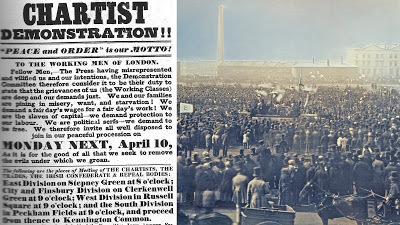
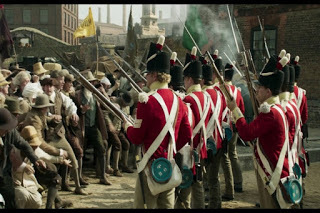 Poor Victoria, and a very worried Albert, are driven from their luxurious London digs at the conclusion of episode one in Season 3 of "Victoria," the PBS Masterpiece costume drama biopic on the life of the British monarch who gave her name to a lengthy period of English (and world) history.
Poor Victoria, and a very worried Albert, are driven from their luxurious London digs at the conclusion of episode one in Season 3 of "Victoria," the PBS Masterpiece costume drama biopic on the life of the British monarch who gave her name to a lengthy period of English (and world) history. The problem is not the broken window in the palace. The real problem with the show's Queen Victoria -- and her series -- is that she never really knows what's going on. No one will tell her. "My people love their queen," she says, because that's what her flatterers tell her. No one, apparently, has pointed out that the country is experiencing a major recession and that a significant percentage of the population is near starvation. Albert, who seemed to have a surer grip on reality in the first season, decides he must "find out how these people live" and is shocked, positively shocked, to discover that poor people are crowded together in substandard tenements. Though, in the few seconds of screen time they are given, the 'poor' household rounded up his handlers appears to consist only of people with respectful middle-class manners. I don't know what audiences are supposed to make of this disconnect between 'the lives of the royals' and the realities of life for ordinary people. The problem, particularly for American audiences, is the series spends much more time on costumes and royal household snits than on the social, political and economic history of the times. The angry crowd mobbing the London streets and hooting threateningly at the palace gates in the last moments of Sunday's Season 3 opening episode didn't come out of nowhere. The show does offer us Albert reading us a sentence or two from Karl Marx, but doesn't connect Marx's theories with the long-brewing popular dissatisfaction with an antiquated political system that preserved the privileges of birth and wealth while offering no political representation to the lower classes. In fact, mass movements demanding political reform stretch back to early years of 19th century. The Chartists, the name for the movement hounding Victoria's domestic tranquility in episode one, set in 1848, were successors of an earlier generation's reform movement arising in the wake of the close of the Napoleonic wars in 1815. With the country's industrial revolution in full sway, the demobilization of soldiers worsened a severe manufacturing depression, combined with food prices kept artificially highly by England's Corn Laws. The Corn Laws protected the wealth of the country's wealthy landowners by placing high tariffs on imported grain. A suffering populace had no one to bring their troubles to in the English government, because ordinary people lacked both suffrage and parliamentary representation. While industrial growth had created boom cities such as Manchester with tens of thousands of workers, the new cities were governed by ancient institutions such as "lords of the manor" and denied even a single MP (member of parliament). Reformists responded with mass marches and demonstrations in behalf of the goal of parliamentary reform. The largest of these turned into the atrocity known as the "Peterloo Massacre" in 1819. The Guardian newspaper's review of Mike Leigh's new film "Peterloo," describes the massacre this way: "On 16 August 1819, at what we would now call a pro-democracy demonstration in St Peter’s Field, Manchester, an excitable band of cavalry and yeomanry – whose commander had airily absented himself for a day at the races – charged with sabres drawn into a crowd of 100,000 unarmed people, many of whom were unable to escape the enclosed space. The troops killed 18 and injured hundreds more."https://www.theguardian.com/film/2018/sep/01/peterloo-review-grit-and-brilliance-in-mike-leighs-very-british-massacre In fact the country's power structure was looking for a violent outcome in order to blame the victims for the violence, arrest and jail the movement's leaders, and suppress the 'reform' movement. Part of Peterloo's legacy is that it prompted western history's first formulation of the idea of a popular revolution through mass action civil disobedience, articulated by the great 19th century poet Percy Shelley's response to the massacre ("The Mask of Anarchy"): "Rise like lions after slumber/ In unvanquishable number" his poem urged. "You are many/ They are few." The basic governmental reforms sought in 1819 did not come about until the First Reform Act of 1832, which made parliament somewhat more representative of the country's population and expanded the right to vote from 400,000 to about 650,000 men. That meant about one in five men could vote. Working class regions, especially the industrial cities in the country's north, remained under-represented. The popular desire to achieve universal male suffrage for all classes and make deeper reforms in a governmental system still largely dominated by a wealthy upper class, with its ancient privileges and disregard of the 'lower orders,' rose again in the 1840s' to rattle Victoria's cage. Chartism -- the name comes from their desire for the enactment of a 'charter' (somewhat similar to a Constitutional amendment, in American terms) -- made a push to establish universal male suffrage and enact some other reforms.
Though inspired in part by the "Revolution of 1848," a series of revolts that drove European monarchs in France, Austria and other states off the throne -- events regarded by the English royals as 'family' tragedies -- Chartists did not seek a revolution. The movement sought changes to make their country more democratic, the chief of these being universal male suffrage. Other demands included the adoption of a secret ballot to shield voters from political pressures; the abolition of "property qualification" for MPs so that voters could have a truly free choice of their representatives; and equalizing constituencies to secure the same amount of representation for the same number of electors (or "one man one vote"). These are basic principles in a representative democracy. Nevertheless, frightened by the European mass revolutions that overthrew monarchs, and afraid that expanding suffrage would weaken their own power, government leaders refused to accept the Chartists' petition. They rallied a massive show of armed force that blunted the Chartists' plan for a people's march on Parliament. I'm probably giving nothing away in pointing out that Victoria and Albert remain safely on their royal seats. Season 3, however, seems determined to make much of the royal household's panicky retreat to an island hideaway on the Isle of Wight. The Chartists' key demands were largely enacted, once again a generation later, in the 1867 or "Second Reform" Act, which gave the vote to "all male heads of household," significantly expanding suffrage for men. Women's suffrage, of course, was still a good way off. I don't know how PBS's "Victoria" will deal with her country's ongoing social and economic pressures for political reform. Or whether in-house and bedroom dramas will be allowed to dominate upcoming episodes. "Victorian" England is popularly known as the age of restrictive clothing, repressive social codes, fear of sexuality, and high mortality rates for children and women. (Also Imperial expansions, slums at home, the growth of a middle class, the birth of the realistic, socially conscious novel, Sherlock Holmes, scientific breakthroughs; the list could go on.) In other histories, I have found the period termed "The Age of Reform." But political reform in 19th century England, as perhaps in all countries, took a long time in coming.
Published on January 15, 2019 21:32
January 6, 2019
The Garden of Verse: Taking a Look at What's Almost Sure to Happen in 2019 -- Twelve Months
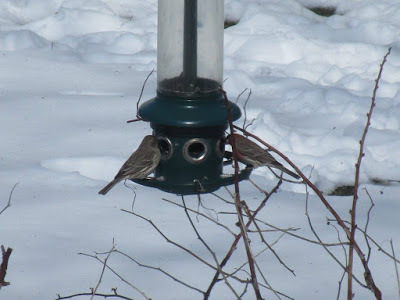 Now that we've finally dispatched 2018 -- perhaps the worst year in American political history (or tied with 2017) outside of the Civil War period -- to the kindness of history, it's time to greet 2019 with poems of the season. Or seasons. Yes, I may be going out on a limb here, but my prediction is that 2019 will include four seasons and all 12 months. That's the rational for my poem in the new January 2019 issue of Verse-Virtual.com, titled "Calendar Poems." The piece consists of 12 short poems, one for each month, each suggesting some element of the named month that's important to me. Here's the part about January:
Now that we've finally dispatched 2018 -- perhaps the worst year in American political history (or tied with 2017) outside of the Civil War period -- to the kindness of history, it's time to greet 2019 with poems of the season. Or seasons. Yes, I may be going out on a limb here, but my prediction is that 2019 will include four seasons and all 12 months. That's the rational for my poem in the new January 2019 issue of Verse-Virtual.com, titled "Calendar Poems." The piece consists of 12 short poems, one for each month, each suggesting some element of the named month that's important to me. Here's the part about January: January
More Snow Coming
Blue snow at twilight
The silence of the day.
On our daughter’s Beirut balcony
the bougainvillea grows new leaves.
We'll see if I'm right. I have a strong, experientially based expectation (call it a gut feeling) that we'll have some snow this month to break the ice of a so far snowless winter. (The photo above illustrates this prediction.) For February, I'm doubling down on the weather talk:
February
Icicles Bar My Window
‘Snew?
Snow!
Snow what?
New snow swallows the sidewalk
Now our car’s snowhere
You can read the rest of this poem here, http://www.verse-virtual.com/robert-knox-2019-january.html
and check out the work of 30 poets in all here: http://www.verse-virtual.com/poems-and-articles.html
I wish everybody the best of years in 2019. Here's hoping that all your months are full of days.
Published on January 06, 2019 14:54
December 31, 2018
The Garden of the Seasons: Some Philadelphia Stories

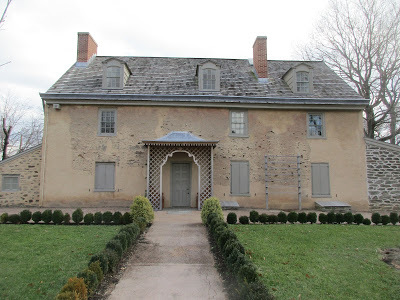
The rubber hit the road last week, some days before Christmas, when dearly beloved Anne, ma femme, displayed her urban road-skill game by turning into a tiny cemented parking apron off a highly trafficked road stretch in the kind of neighborhood people these days are calling "sketchy." Even in a car as comparatively small as ours, which can U-turn almost anywhere, I would not have chosen this improbable off-road sanctuary to pause for a "recalculation" since a reversal of course lay clearly ahead in our immediate future. Recalculation over: Yup, gotta go back the way we came and turn either left or right at the numbered-road intersection of Nothing and Nowhere-but-traffic. Several backs and forths get the car eventually pointed down the drive toward the a now crowded roadway, having missed our light.
 Tongue firmly between my teeth, I swivel my noggin left and right to catch portents of doom while Anne inches out into the traffic and waves at drivers. Drivers in Philadelphia are more likely to be nice than elsewhere (such as New York and Boston), but even the lady who stops and waves us out eventually gives up since the lane next to her keeps moving past us. After we finally emerge onto the road, heading the wrong way, a reversal of course is somehow managed and when make our way back to the Intersection of Indecision the "voice of the machine" firmly sends us one way, the wrong way, and immediately calls for a U-turn. My tongue is well chewed. Utterly dependent on The Voice in this new city, we slowly slink our way into a West Philadelphia residential neighborhood of numbered streets, and everything just gets friendlier and friendlier.
Tongue firmly between my teeth, I swivel my noggin left and right to catch portents of doom while Anne inches out into the traffic and waves at drivers. Drivers in Philadelphia are more likely to be nice than elsewhere (such as New York and Boston), but even the lady who stops and waves us out eventually gives up since the lane next to her keeps moving past us. After we finally emerge onto the road, heading the wrong way, a reversal of course is somehow managed and when make our way back to the Intersection of Indecision the "voice of the machine" firmly sends us one way, the wrong way, and immediately calls for a U-turn. My tongue is well chewed. Utterly dependent on The Voice in this new city, we slowly slink our way into a West Philadelphia residential neighborhood of numbered streets, and everything just gets friendlier and friendlier.
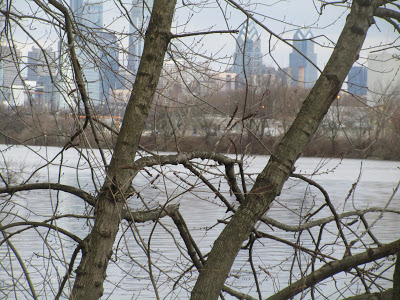 Having found The Street Where She Lives (our daughter) we now hunt for the four-digit number. I point out that the number in the hundreds column goes up by one after each intersection, so that when we intersect 48th Street, for example, the house numbers on the avenue now begin with 48(00), instead of 47. Enlightenment! Everyone's urban skills are on display today. Anne begins the deeper game of looking for a parking space. And finds one -- exactly in front of Sonya's door. Eureka! Our luck is definitely changing.
Having found The Street Where She Lives (our daughter) we now hunt for the four-digit number. I point out that the number in the hundreds column goes up by one after each intersection, so that when we intersect 48th Street, for example, the house numbers on the avenue now begin with 48(00), instead of 47. Enlightenment! Everyone's urban skills are on display today. Anne begins the deeper game of looking for a parking space. And finds one -- exactly in front of Sonya's door. Eureka! Our luck is definitely changing. Sonya's apartment is the lower half of a single house built as one of the semi-detached, mostly brick houses that run throughout this large up-trending neighborhood -- up and down all those numbered streets and tree-named avenues. The buildings strike me as structurally attractive and they're all appropriately (and some lavishly) landscaped with ornamental grasses and shrubs. Everything's lovely and personalized and somehow cool. Holiday lights. Lots of independently, probably locally, owned shops, cafes and restaurants. We explore on foot for an hour as light fades, seeing parks, streetcar tracks where the brightly colored rail cars take you down to Central City, and an ad-hoc corner Christmas tree lot has popped up with offerings we vow to inspect the next day. Our first business the following day, a Sunday, is to explore the historic district in ur-Philadelphia, home of the Founding Documents. Lots of history here, especially in those first American centuries and even more pointedly in the days of the creation of an independent American nation.
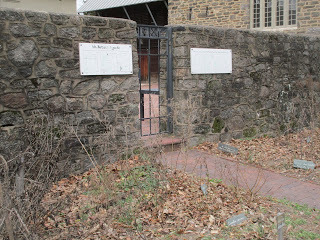 But, guess what?, business is closed. By order of the so-called President of the United States. His Phoniness has shut down the part of the government that owns and oversees places such as the hall where the Declaration of Independence was approved, declared, and announced to the world. Two uniformed personnel, whom I can only think of as "federal cops," whatever their uniform was actually supposed to connote. They stood behind a long ad-hoc symbolic fence, consisting of a single chain length and lots of silly black posts, which they appeared to be guarding -- against what or whom I cannot imagine. Would angry hordes be expected to rush the doors of the closed establishment and damage the sacred artifact within by banging on the portal? Actually, the only horde around was me... Between me and the fake-fence lay a strip of ye old cobbled roadway, created long after the fact to lend ambience. As I approached the fence, the two officers, one female, began waving me away as if to protect my safety from the terrors of urban traffic, of which there was absolutely none because no driver in his right mind takes a cobbled road when smoother roadways are available. Somehow I'd forgotten to take my camera along so there is no visual record of this interesting moment when I am confronted by authority. "It's closed," the female guard shouts. The male one repeats this interesting news. "I know it's closed. I just want to look at it." "Get out of the road!" she calls. "You're not safe." "I'm extremely safe," I reply. "It's this stupid government of ours that's not safe." Things go downhill from there. I can't recall everything they said, or I said, but I do remember saying-shouting something on the order of... "Maybe if we had a real President the building would be open to the public! I'm the public! Why can't I see my building?... "We need a real President and a decent government!" I added. The uniforms are kind of staring at me, I seem to remember, as if expecting me to throw a bomb or something, and at this point my loving spouse feels an urgent summons to rescue me from encounters with authority. It's a recurring theme in our relationship, from the time I ran away from an enraged fish monger pursuing me with a raised cleaver in Boston's fabled Haymarket. These two federal cops were not raising their cleavers, and I'm not sure I needed rescuing, but Anne is shouting at me to withdraw from my position in a supposedly hazardous roadway while in close encounter with uniformed personnel and shouting uncomplimentary remarks about their ultimate employer, the Faker-in-Chief. And to shut up, which is probably her main point. Naturally I accede to these words of wisdom, since I am a well brought up citizen of these United States and am a product of a middle-class upbringing, in which I was taught from childhood not to make a spectacle of myself. My country's so-called leaders, however, let the record show, make unedifying spectacles of themselves whenever they open their mouths. Still, I suppose there is nothing much I can accomplish by insisting on my First Amendment rights to a couple of federal cops, who presumably are still getting paid. Damn, I should have brought my camera.
But, guess what?, business is closed. By order of the so-called President of the United States. His Phoniness has shut down the part of the government that owns and oversees places such as the hall where the Declaration of Independence was approved, declared, and announced to the world. Two uniformed personnel, whom I can only think of as "federal cops," whatever their uniform was actually supposed to connote. They stood behind a long ad-hoc symbolic fence, consisting of a single chain length and lots of silly black posts, which they appeared to be guarding -- against what or whom I cannot imagine. Would angry hordes be expected to rush the doors of the closed establishment and damage the sacred artifact within by banging on the portal? Actually, the only horde around was me... Between me and the fake-fence lay a strip of ye old cobbled roadway, created long after the fact to lend ambience. As I approached the fence, the two officers, one female, began waving me away as if to protect my safety from the terrors of urban traffic, of which there was absolutely none because no driver in his right mind takes a cobbled road when smoother roadways are available. Somehow I'd forgotten to take my camera along so there is no visual record of this interesting moment when I am confronted by authority. "It's closed," the female guard shouts. The male one repeats this interesting news. "I know it's closed. I just want to look at it." "Get out of the road!" she calls. "You're not safe." "I'm extremely safe," I reply. "It's this stupid government of ours that's not safe." Things go downhill from there. I can't recall everything they said, or I said, but I do remember saying-shouting something on the order of... "Maybe if we had a real President the building would be open to the public! I'm the public! Why can't I see my building?... "We need a real President and a decent government!" I added. The uniforms are kind of staring at me, I seem to remember, as if expecting me to throw a bomb or something, and at this point my loving spouse feels an urgent summons to rescue me from encounters with authority. It's a recurring theme in our relationship, from the time I ran away from an enraged fish monger pursuing me with a raised cleaver in Boston's fabled Haymarket. These two federal cops were not raising their cleavers, and I'm not sure I needed rescuing, but Anne is shouting at me to withdraw from my position in a supposedly hazardous roadway while in close encounter with uniformed personnel and shouting uncomplimentary remarks about their ultimate employer, the Faker-in-Chief. And to shut up, which is probably her main point. Naturally I accede to these words of wisdom, since I am a well brought up citizen of these United States and am a product of a middle-class upbringing, in which I was taught from childhood not to make a spectacle of myself. My country's so-called leaders, however, let the record show, make unedifying spectacles of themselves whenever they open their mouths. Still, I suppose there is nothing much I can accomplish by insisting on my First Amendment rights to a couple of federal cops, who presumably are still getting paid. Damn, I should have brought my camera. The rest of the day in historic downtown Philadelphia is wholly pleasant, adult and gratifying. We ever learn some good history about the early days of the independence movement from a volunteer in historian in another building -- happily not owned by the federal government.
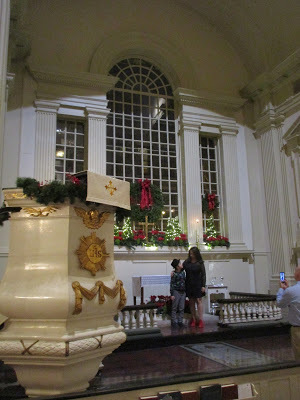 Called Carpenters' Hall, it's the site of the First Continental Congress. It took place in 1774, a time -- our volunteer told us -- when the delegates were looking for ways to temper their dispute with British authorities. They penned a long list of grievances, and hoped for what today we would call "a dialogue" on how to repair relations between the colonies and the 'mother country' and removed some of the causes of a rift that threatened to grow larger. Under the belief that the King was sympathetic to their position, and that the biggest problems stemmed from acts of Parliament, they sent the petition directly to him. But the king simply ignored their petition, and did not reply. Carpenters Hall, we learned, originally a meeting place for the Carpenters Guild, was also leased for other uses. Benjamin Franklin used space there to set up the first American post office, the first lending library, and first 'fire insurance' incorporation so that neighbors could help one another after a serious loss of property from fire and know that they would receive help in turn if it happened to them. When the Second Continental Congress convened in 1775, again in Philadelphia, they met in the larger building now called Independence Hall. Relations between the colonies and Great Britain during this time, especially in Boston, where the port was closed and the city occupied by armed soldiers. By the time the delegates finally took a vote on independence, acts of war had already taken place: the battles of Lexington and Concord, and then the bloodbath of Bunker Hill. I would have been happy to discuss these points with the two cops in the front of that hall in a civil war, but they simply wanted to make the problem (Mr. Public me) go away. The Carpenters Hall guide also suggested a few historical attractions to us that would be open, including the Museum of the American Revolution (which we didn't make) and the historic Christ Episcopal Church (more about that below).
Called Carpenters' Hall, it's the site of the First Continental Congress. It took place in 1774, a time -- our volunteer told us -- when the delegates were looking for ways to temper their dispute with British authorities. They penned a long list of grievances, and hoped for what today we would call "a dialogue" on how to repair relations between the colonies and the 'mother country' and removed some of the causes of a rift that threatened to grow larger. Under the belief that the King was sympathetic to their position, and that the biggest problems stemmed from acts of Parliament, they sent the petition directly to him. But the king simply ignored their petition, and did not reply. Carpenters Hall, we learned, originally a meeting place for the Carpenters Guild, was also leased for other uses. Benjamin Franklin used space there to set up the first American post office, the first lending library, and first 'fire insurance' incorporation so that neighbors could help one another after a serious loss of property from fire and know that they would receive help in turn if it happened to them. When the Second Continental Congress convened in 1775, again in Philadelphia, they met in the larger building now called Independence Hall. Relations between the colonies and Great Britain during this time, especially in Boston, where the port was closed and the city occupied by armed soldiers. By the time the delegates finally took a vote on independence, acts of war had already taken place: the battles of Lexington and Concord, and then the bloodbath of Bunker Hill. I would have been happy to discuss these points with the two cops in the front of that hall in a civil war, but they simply wanted to make the problem (Mr. Public me) go away. The Carpenters Hall guide also suggested a few historical attractions to us that would be open, including the Museum of the American Revolution (which we didn't make) and the historic Christ Episcopal Church (more about that below). My advice is to the inquiring tourist. Always talk to the guides, volunteer or not. They know stuff. And don't bother with the uniformed, weaponized arms of the State. they don't know shit. We three celebrants declared our own independence from our previous family custom that evening by acquiring a modestly sized Christmas tree at the little corner lot, carrying it on foot with a two-person carriage-technique back to Sonya's apartment, and inserting it into the stand. We trimmed it that evening with an interesting red and white motif consisting of stringed popcorn garlands and a box of copious and variously patterned red balls, plus and a few oddballs such as the orangey-tan "matzoh ball." The next day we visited the nation's oldest surviving botanical garden, Bartram's Garden, located on the banks of the Delaware River, and offering a good view of the city skyline (photo above). A famous botanist named John Bartram founded it in 1728. A National Historic Landmark, the garden is looked after by the John Bartram Association today. Which means, of course, you can get married there. The site includes some lovely old buildings, closed naturally for winter, some planting grounds where hardy herbs and vegetables were still growing -- the cabbage and cauliflower family plants were still green; and Sonya found a single flowering pansy-- and also a medicinal garden of healing plants, a boardwalk trail that takes you down to the riverside, and specimen trees including (according to a sign) the oldest ginkgo tree, an Asian import, in America. It was fun to prowl around there and walk the trails in the dead of winter, and the place must be amazing in summer.
That brings us to Christmas Eve (just one more day until "The Twelve Days of Christmas" begins). Since we had glimpsed the interior of Christ Church downtown and found that it was not only a beautiful church but reminded me so much of the church I attended as a child and of the decades of Christmas Eve services we attended there with my mother, I decided we should go there for Christmas Eve service. I understood that the early timing (5 p.m.) meant this was a family service. Still, I thought, Episcopalian churches always have good music. Well, there was some music, but more essentially, the business was built around a pageant. High points: The famous mismatched couple spend a night in a barn in the company of animals, the narrator tells us... long pause while the one-year-old set is rounded up and brought to the manger scene in their woolly sheep costumes. I don't know if I've ever seen so successful a sheep costume (or any sheep costume) before. They are memorable. One little girl, so costumed, wanders down the aisle with her lambkin ears flopping until some keeper (as in the New Testament parable) is dispatched finally to go after her. Stars are introduced; white shift, tinfoil on stick. Angels intrude, twitchy little girls with glittery headpieces and wands and other angel-gear. The shepherds, two slightly tubby seven-year-old boyos, miss their cue. Repeat cue. They miss it again... "Hey, guys..." A friendly chaos of nursery school types lightly supervised by their gentle keepers ensues as some more parts of the famous story are read -- the choir sings softly behind -- and certain members of the congregation -- late comers, we're leaning over the front row of the balcony (having been delivered initially by our Lyft driver to the wrong Christ Church) -- and nearly falling over themselves in laughter -- a conceivably bad idea in balcony seating -- in pure amusement over the spectacle. Different, but fun. I don't know what the national reputation makers are saying these days, but personally speaking, Philadelphia may be our new 'fun city.'
Published on December 31, 2018 19:44
December 27, 2018
The Garden of the Seasons: "The Seven Days of Christmas"
 We have to make the season last. My sort-of-silly memoir of Christmas week last year, titled "The Seven Days of Christmas," is published on "Beneath the Rainbow."
We have to make the season last. My sort-of-silly memoir of Christmas week last year, titled "The Seven Days of Christmas," is published on "Beneath the Rainbow." Written last year, the story references family events in the first half of that traditional "Twelve Days of Christmas" period observed in days of yore in many countries. The twelve days run from Dec. 25, the conventional birth date of Jesus, to Jan. 5, the last day before the celebration of Epiphany on Jan. 6, marking the revelation of Jesus's divinity to the three wise men.
That is to say, you can celebrate in a festive Medieval way, feasting, drinking, and hiring players to perform entertainments -- one of Shakespeare's comedies was called "Twelfth Night" because it was written to be performed at a Twelfth Night celebration at the English court -- until Epiphany. Then you have to get serious for a while.
Nothing so grand happens in my little remembrance of the trials and triumphs in our last year's "Seven Days of Christmas": A sudden snowstorm fouls up plans. We almost miss a ferry. I have a briefly tempestuous exchange with a brat suffering from an excess of self-esteem attempting to keep us off the boat.
A very brief excerpt:
“You’re way over cut-off time,” he said
Cut-off time? The phrase was new to me. I pondered it.
Is that the time when I cut off his ear?
Once we get on the water, however, everything goes swimmingly.
You can see for yourself at this link taking you to the story posted on "Beneath the Rainbow," an active online journal, putting up new stories every week.
http://beneaththerainbow.com/the-seven-days-of-christmas/
Published on December 27, 2018 10:17
December 20, 2018
The Garden of Verse: December's Verse-Virtual Is Alive with The People of Verse
 Some appreciative thoughts on a few of the many poems I loved in the December issue of Verse-Virtual.
Some appreciative thoughts on a few of the many poems I loved in the December issue of Verse-Virtual. You can read any or all of these at http://www.verse-virtual.com/poems-and-articles.html On first encountering Robert Wexelblatt's poem "After Three Glasses of Slivovitz Mrs. Podolski Explains What She Believes In," I went straight to Google to look up 'Slivovitz.' Then I had to say, 'I'm having what she has.' This poem is like a semester course on the concept of belief delivered in sharply amusing poetic language, whether fueled by that "fruit brandy made from damson plums" or some other elixir of the gods, as in this tart observation: "People want to know what you believe in
as if the answer were going to rip
open the bag of skin in which we’re all
sewn at conception. " Then I remembered that I once actually took a semester philosophy course in 'The Concept of Belief.' This poem is a hundred times better (with an incalculable savings in time) and very timely because people keep saying things like 'I don't believe in X or Y' -- and pollsters keep asking questions like 'Do you believe in evolution?' or 'global warming.' These are not matters of 'belief.' They are matters of fact. Mrs. Podolski is quite philosophical in addressing questions put to her by a 'believer': "Do I believe in religion? She wanted
to know if I believed what she believed,
of course. That’s what the question usually
signifies, not always. Do you believein me is just about as common. DoI credit your existence as one might,say, God’s, I ask as politely as I
can." The poem also quivers with sharp social observations: "Oh, I guess
belief is enlarging and a comfort
to those who manage it; still, I seem to
find it most among the gullible and
smarmy." These excerpts just scratch the surface of a remarkable performance, a contribution to the poetry once called "the dramatic monologue," in which the drama takes place in the minds of those who read the poem.
December is alive with the people of verse. Another is the title character of Joan Mazza's poem "My Mother Returns," in which I am stopped short by this image: "She reappears as a tomato, hiding
oozing rot where it meets the counter." That's exactly how my tomatoes behave. (Mom? Is that you?) And then this arresting demonstration of maternal knowhow: "She demonstrates how to smack the garlic/ clove with the flat blade of my largest knife." Any poem that teaches us how to mince garlic is a work to be reckoned with.
Kate Sontag offers another look at people in her broadly characterizing "Women At Sixty," who "learn to love themselves in a new way—
like thirty, forty, and fifty
but more immensely." That adverb struck me as just right. Human personalities grow larger as we age. The poem puts it this way: "At sixty they
have more plot twists
to add to stories..." A strong poem that convinces this reader that our plots are still twisting.
Mary Makofske's poem "Signs" gives us quick incisive portraits of two men whose actions tell us something important about them. The conduct of one is correct, but that's all. The second man, as the observant eye of the poet realizes, is a deeper sort. That plastic saint on the dashboard, the poem tells us, "wasn’t yours, exactly, but a gift from your mother..." Keeping and displaying it is an act of kindness and consideration for another. Steve Klepetar has three beautiful and moving poems about his father, who was "driven" from his home by the "storm" that took the lives of his parents and so many others. In the poem "This Land" voiced in a first person narration, we learn that after the storm broke... "I lived behind a curtain of rain.
I was hungry and ate shadows for sixteen days.
I came to this land carrying nothing, not even a history or a voice.
I had no language but the one I learned on these wild streets.
I came to this land with my fists and my blood.
I came with people who had no home,
who were torn from their lives, who were broken and sad..." Written in a strong, declarative style -- the repetitions above suggest a chant; the language calling on both particulars and universals -- the poems amount to a biography of the soul.
It was hard to open December's issue without finding strong and moving evocations of human life and remarkable images. In Joan Colby's "The Heart of a Woman" we are commanded: "Consider where love resides:In the red pumphouse where fires are continually being litAnd being put out."
Her poem "A Woman Scorned" goes straight to business:
"A woman scorned sets fire to the tent
Where the new wife is celebrating.
Carves her name and yours into a tree
Then chops that tree down with her nail file." What an image. How much determination -- and anger -- would it take to do manual construction (or destruction) with a nail file? We get the point.
Alive to the magic of meter, Marilyn Taylor's "Contingency" plays a happy tune on a sad predicament. This is intentional, as she tells us in her note, because a "bouncy triple meter" is unexpected in a poem on this subject. I'm caught by the image of "another pale-blue moon" for the daily-dose morphine tablet a fading mind stores in hiding against some inevitable "contingency." Then -- knock, knock! contingency calling! The magic of the metrical dance lifts us above that final sadness.
The "Novel," the title of the first poem in Donna Hilbert's "Six Genre" sequence, fittingly focuses on human lives and their crises. The poem gets right to it: "Anna under the train,
Emma’s apothecary poison,
and my late-twentieth century
life meanders, lacks plot." Each of these six not-so-easy pieces offers pleasingly genre-fitting images and details. In "Short Story" the end comes, the poem notes coolly, with no further chapters
"in which the piper appears
demanding to be paid..." The piece titled "Opera" tell us "Every night while I cook dinner
Mimi dies..." In poems, of course, we're all immortal. Or something near to it. Reading the poems in December's Verse-Virtual I come away with intimations of the sort.
See http://www.verse-virtual.com/poems-and-articles.html
to read these, and many other poems to choose from.
Published on December 20, 2018 14:11



